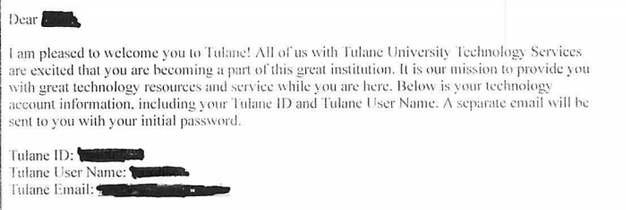You have /5 articles left.
Sign up for a free account or log in.

Getty Images
Year after year, some college or another sends the wrong list of applicants the news that they have been admitted. And the college then offers up an apology (but no admissions slot). Sometimes the applicants are subsequently admitted, but sometimes those who received the misleading emails are rejected. Many times the errors originate in the admissions office, where these lists are typically generated.
 This year, Tulane University's technology department seems to be responsible for an email message that incorrectly informed about 130 applicants -- all anxiously awaiting their early-decision notifications -- of their new email accounts and passwords. While the emails didn't come from admissions, the introduction -- "I am pleased to welcome you to Tulane" -- led most applicants to think they were receiving good news.
This year, Tulane University's technology department seems to be responsible for an email message that incorrectly informed about 130 applicants -- all anxiously awaiting their early-decision notifications -- of their new email accounts and passwords. While the emails didn't come from admissions, the introduction -- "I am pleased to welcome you to Tulane" -- led most applicants to think they were receiving good news.
The new email addresses and passwords even worked, so these happy applicants could send and receive email from what they thought would be their new institution. Then the email accounts stopped working. Then came the bad news.
"You may have recently received an email with log-in credentials to a Tulane email account. This email was sent in error and should be disregarded," the (accurate) email said. "We apologize for the confusion."
Tulane released the following statement: "On Dec. 14, 2016, Tulane Technology Services inadvertently sent a notification to 130 early-action applicants to Tulane University. This email included a 'Welcome to Tulane' salutation from our technology team, along with instructions on how to set up a Tulane email account. This message implied admission to Tulane, although a decision has not yet been made in the case of these students. Tulane deeply regrets the confusion, anger, disappointment and frustration caused by this error. We have informed these 130 students that this message was sent to them in error."
The statement attributed the mistake to a change in software systems. "Tulane is conducting a thorough review to ensure that this can never happen again," the statement said.
Mark A. Montgomery of Great College Advice, which advises students and their families on college admissions, said via email that it's time for colleges to find a way to prevent such problems, not just apologize after the fact. A colleague of his at Great College Advice is working with a student who received the incorrect notification this week.
"This happens every stinking year," he said. "The perpetrators change, but the effects are the same: a) emotionally fractured kids and b) a lack of faith in the integrity of the admissions systems at the college involved. So disappointing."




